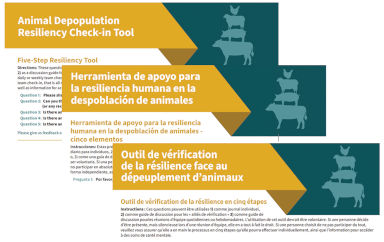The AASV Student Engagement Committee is pleased to announce the selection of Mallory Wilhelm, a second-year veterinary student at Iowa State University (ISU), as the incoming alternate student delegate to the AASV Board of Directors.
Mallory has embraced many opportunities available to veterinary students interested in swine, and she brings a variety of experiences to her new role. After a production internship during college, she shared her knowledge as a teaching assistant for an undergraduate swine science course. During two summers in the Swine Veterinary Internship Program, she completed research projects in immunology and biosecurity. She presented her research at the 2023 AASV Annual Meeting, and she will present again during the 2024 AASV Annual Meeting. Mallory is active in the ISU Student AASV chapter, where she is the current wet lab coordinator.
When thinking about her upcoming role with AASV, Mallory said, “I am committed to improving the AASV organization for both veterinarians as well as veterinary students.” When Mallory graduates in 2026, she plans to be a part of the swine industry and remain active within AASV.
Mallory will assume her duties as alternate student delegate during the 2024 AASV Annual Meeting. The current alternate delegate, Alexis Berte (ISU, 2025), will assume the delegate position currently held by Hunter Everett (NCSU, 2024), who will rotate off the board. Alexis and Mallory will represent student interests within AASV as nonvoting members of the Board of Directors and the Student Engagement Committee. Please join us in welcoming Mallory to the AASV Board of Directors and thanking Hunter for his service!
AASV conference proceedings online
More than 230 papers representing the presentations at the 2024 AASV Annual Meeting are now available for AASV members to access at aasv.org/library/proceedings/.
Current 2024 dues-paid membership is required to access the files.
As in the past, the papers are available as follows:
- The “big book” of all the regular session papers in a single PDF file with a linked table of contents
- Seminar booklets: a PDF collection of the papers for each seminar
- An individual paper for each presentation is available in the Swine Information Library: aasv.org/library/swineinfo/
You will be prompted for your AASV website username and password to access the files. If you have forgotten your password, use the “Reset Password” link in the upper right of the AASV website (aasv.org) or contact the AASV office for assistance.
Animal Depopulation Resiliency Check-in Tool now available in French, Spanish, and English; training video created


The Animal Depopulation Resiliency Check-in Tool (ADRCT), a 5-question public health protocol for stakeholders who are preparing for, participating in, and recovering from animal depopulation, created by AASV and Dr Elizabeth Strand, is now available in French, Spanish, and English. A short video describing how to use the tool is also available. All ADRCT resources are available at aasv.org/resources/depop-resiliency.php.
Animal depopulation is associated with distressing psychological impacts on people. These impacts affect many stakeholders including veterinarians, producers, public health officials, and others who make decisions about and carry out depopulation.
The goals of the ADRCT are to:
- Identify any psychological distress that may result from depopulation,
- Promote social support and coping among those engaged in the depopulation process, and
- Help individuals who may need mental health intervention by providing referral information for additional support.
The American Association of Swine Veterinarians received funding from the US Department of Agriculture Animal and Plant Health Inspection Service through their National Animal Disease Preparedness and Response Program in 2021 to develop resources, including the ADRCT, to build and improve capabilities and capacities for responding to emergency events that require animal depopulation. Those resources are available at aasv.org/Resources/welfare.
